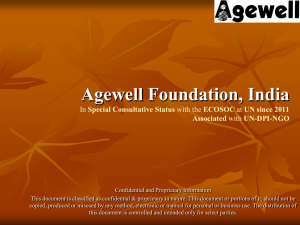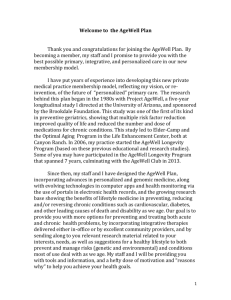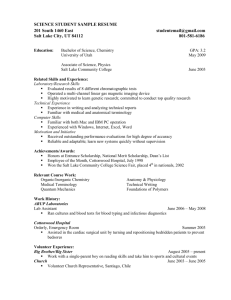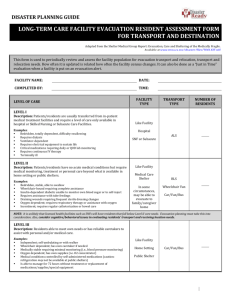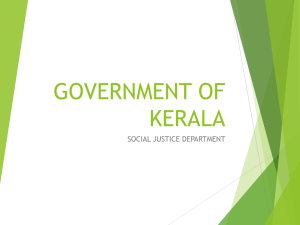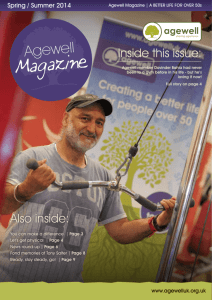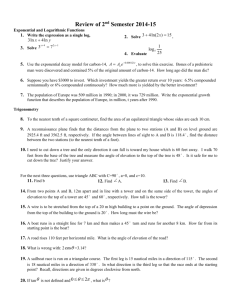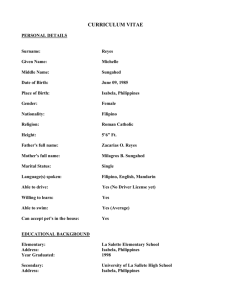bedridden patients of delhi & ncr
advertisement
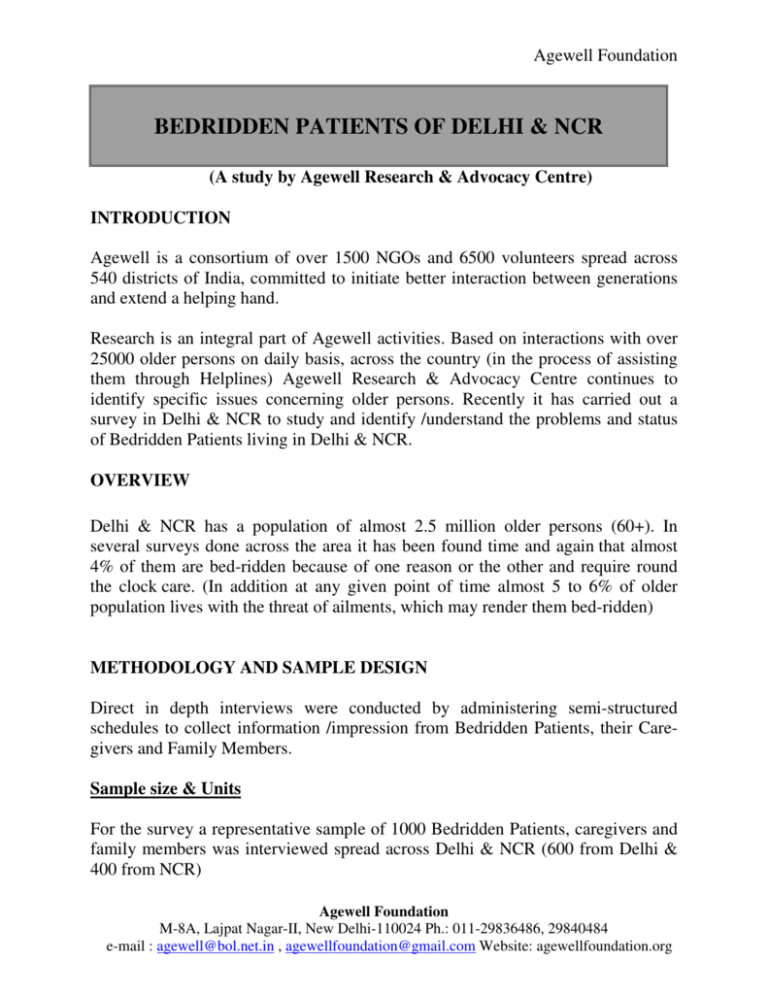
Agewell Foundation BEDRIDDEN PATIENTS OF DELHI & NCR (A study by Agewell Research & Advocacy Centre) INTRODUCTION Agewell is a consortium of over 1500 NGOs and 6500 volunteers spread across 540 districts of India, committed to initiate better interaction between generations and extend a helping hand. Research is an integral part of Agewell activities. Based on interactions with over 25000 older persons on daily basis, across the country (in the process of assisting them through Helplines) Agewell Research & Advocacy Centre continues to identify specific issues concerning older persons. Recently it has carried out a survey in Delhi & NCR to study and identify /understand the problems and status of Bedridden Patients living in Delhi & NCR. OVERVIEW Delhi & NCR has a population of almost 2.5 million older persons (60+). In several surveys done across the area it has been found time and again that almost 4% of them are bed-ridden because of one reason or the other and require round the clock care. (In addition at any given point of time almost 5 to 6% of older population lives with the threat of ailments, which may render them bed-ridden) METHODOLOGY AND SAMPLE DESIGN Direct in depth interviews were conducted by administering semi-structured schedules to collect information /impression from Bedridden Patients, their Caregivers and Family Members. Sample size & Units For the survey a representative sample of 1000 Bedridden Patients, caregivers and family members was interviewed spread across Delhi & NCR (600 from Delhi & 400 from NCR) Agewell Foundation M-8A, Lajpat Nagar-II, New Delhi-110024 Ph.: 011-29836486, 29840484 e-mail : agewell@bol.net.in , agewellfoundation@gmail.com Website: agewellfoundation.org Agewell Foundation Volunteers' network spread across the city worked as interviewers for the survey. The interviews were conducted during the month of September 2009. MAJOR FINDINGS • It was found that percentage of bedridden men patients (67.5%) is higher than bedridden women patients (32.5%) among total bedridden patients of Delhi & NCR. • 66.5% of the total bedridden patients were confined to bed for a short period (less than 12 months) while 33.5% of the total contacted bedridden patients were long-term patients. 700 700 600 600 500 500 400 300 Male 400 Female 300 200 200 100 100 0 Short Term Long Term 0 Bedridden Patients Bedridden Patients • Almost 76.5% were partially affected while 23.5% bedridden patients were severely affected. Severly Affected Partially Affected 0 100 200 300 400 500 600 700 800 • Due to physical chronic illness, heart attacks or accidents more people remain in Bedridden condition. Almost 86.1% of all the respondents were affected by physical chronic illness, heart attacks or accidents Agewell Foundation M-8A, Lajpat Nagar-II, New Delhi-110024 Ph.: 011-29836486, 29840484 e-mail : agewell@bol.net.in , agewellfoundation@gmail.com Website: agewellfoundation.org Agewell Foundation • 13.9% of the respondents approached by interviewers were affected by different kinds of mental/psychological problems. Mental/Psychological Physical problems Bedridden Patients 0 100 200 300 400 500 600 700 800 900 • When information collected from survey was analysed, it was also found that older persons (60+) constitute major part of bedridden patients. Approx. 65% of the bedridden patients were reported from older persons category. 700 600 500 400 300 200 100 0 Numbers of Bedridden Patients <20 yrs 21 - 40 yrs 41-60 yrs Older Persons 47 101 201 651 • It was found that bedridden patients were facing different types of practical problems. Their major problems include non-availability of caregivers, depression/nervousness, cleanliness & hygiene, bedsores, high blood pressures, etc. • There were almost 30.6% bedridden patients, who have reported that they need caregivers urgently or who were found without any proper caregiver, in spite of the fact that they need care giving facility urgently. Agewell Foundation M-8A, Lajpat Nagar-II, New Delhi-110024 Ph.: 011-29836486, 29840484 e-mail : agewell@bol.net.in , agewellfoundation@gmail.com Website: agewellfoundation.org Agewell Foundation 1000 High blood pressure, 900 800 Bedsore, 700 Cleanliness/hygie ne, 600 500 400 300 Depression/Nervo usness, Non-availability of caregivers, 200 100 0 • Amongst Bedridden patients contacted by the survey team, almost 38% patients were taken care by their spouses, 23% by their family members and 39% by caregivers. Family members 23% Spouse 38% Care giver 39% • When respondents were asked about to prioritize the most effective health recovery techniques, almost 33% patients ranked Positive Attitude followed by Care-giving (25%). Medicines Exercise (Phy.Mental) Nutrition Caregiving Positive Attitude Agewell Foundation M-8A, Lajpat Nagar-II, New Delhi-110024 Ph.: 011-29836486, 29840484 e-mail : agewell@bol.net.in , agewellfoundation@gmail.com Website: agewellfoundation.org Agewell Foundation SALIENT OBSERVATIONS Though a person could be bedridden because of several reasons but the most common among them is old age and its related ailments. The under preparedness and lack of any knowledge or training to take care of bedridden patients is repeatedly highlighted by number of bedridden patients. Older persons who are bed-ridden (because of whatever reasons) and their care givers, face insurmountable problems in absence of any knowledge or training to look after such older people. Indeed it is tough for entire family to cope with a situation of looking after bedridden patient. At least 2 to 3 immediate family members have to go though tremendous amount of emotional, physical and psychological trauma in each family, where ever there is a bed ridden older person in the family. Needless to say this is an ongoing phenomenon and can happen with any family at anytime. Social alienation is one of the major problems of patients, especially older patients that’s why they are in urgent need of caregivers. “She is alive and that’s about all. I am the one who is suffering. It is so difficult look after a person like this. I feel like running away from all this.” - Kavita Katyal “No training of any kind is available for family members. It is essentially trial an error… Doctors do tell us what to do but practically it’s a very difficult situation.” - Mrs. Neeraja Jhingan “What do I do with him. He is my husband but I am now like a mother to him. He doesn’t speak … so I can only guess as to what he needs.” - Mrs. Sharma “I can do everything, but cleaning up several times a day… its too much. – Mr. Kamal Khurana “Changing a child’s nappy is OK… but you can’t even imaging how repulsive it is to change an adult’s diaper…” - Meenakshi Rao Agewell Foundation M-8A, Lajpat Nagar-II, New Delhi-110024 Ph.: 011-29836486, 29840484 e-mail : agewell@bol.net.in , agewellfoundation@gmail.com Website: agewellfoundation.org Agewell Foundation Conclusion Since older persons constitute major part of bedridden patients, there is an urgent need to develop and strengthen volunteers’ network to take care of older persons. It is imperative to initiate training programs for affected family members/relatives of bedridden patients and even bedridden patients, so that they can get adequate knowledge and information on how to take care of persons confined to bed. Agewell Foundation M-8A, Lajpat Nagar-II, New Delhi-110024 Ph.: 011-29836486, 29840484 e-mail : agewell@bol.net.in , agewellfoundation@gmail.com Website: agewellfoundation.org
